Editor’s Note:
Why didn’t Obama call Panetta for updates?
Key piece of information from our friends at The N.Y. Post:
The call went from the White House to Secretary of State Hillary Clinton.
http://nypost.com/2014/06/22/clinton-bristled-at-benghazi-deception-book/
“By 10 p.m. on Sept. 11, 2012, when Hillary Clinton received a call from President Obama, she was one of the most thoroughly briefed officials in Washington on the unfolding disaster in Benghazi, Libya.”
Get the Citizen’s Commission on Benghazi here:
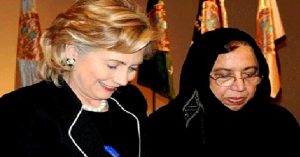
Editor’s Note: From our good friend Stephanie Jason and our friends at The Hill.com
Stephanie M. Jason is a Middle East and North Africa expert, who has spent
extensive time in Libya since 2004 and was on the ground in Baghdad, Iraq
during Operation Iraqi Freedom. She was a friend of the late Ambassador
Chris Stevens and was with him in Tripoli two months prior to his murder in
Benghazi.
Obstruction, lies and dishonor: Hillary’s Benghazi legacy
July 05, 2016, 09:44 am
By Stephanie M. Jason


“If you guys don’t get out here, we’re all going to f—-ing die.”
These first words of truth, spoken frantically by a Diplomatic Security Agent in Benghazi while under attack, are quoted for all to read as the first sentence of the House Select Committee’s comprehensive report Part I, “Terrorist Attack on U.S. Facilities in Benghazi.” http://benghazi.house.gov/NewInfo
The theme that hits home throughout the report is the litany of excuses from the Obama administration as they struggle to explain away their failure to act. Not surprisingly, the same “talking point rationale” is used repeatedly – “tyranny of time and distance”. (Panetta Transcript at 47)
After a thorough investigation, delayed and repeatedly obstructed by House Democrats and the Obama Administration, Chairman Trey Gowdy and his Republican committee members managed to piece together and document volumes of facts. These facts recount actions and in-actions before, during and after the attacks.
Their report starkly contrasts the heroism of GRS personnel, Diplomatic Security Agents and Team Tripoli fighting to protect America lives in Benghazi, with the total incompetence and dereliction of duty of so-called “leaders” in D.C. who chose to talk and spin while actually doing nothing.
Apparently those who chose that night to debate videos and uniforms, and who have never smelled the smoke of battle, think Americans are stupid enough to buy their after-the-fact excuses for why they did not even attempt to rescue over thirty Americans facing multiple assaults.
Excuses after-the-fact simply do not cut it. American lives were at stake. The Special Mission Compound and Annex were under attack, and no one could have possibly known how long the battle would continue. There is no ‘magic crystal ball’ telling you when an attack will end or if you will survive. As the brave Americans who fought valiantly that night demonstrated, you just keep fighting and hope a relief force will arrive before you run out of ammo or out of luck.
The Select Committee report reveals that three-minutes after the first wave of assault began at the Special Mission Compound in Benghazi (roughly 3:42pm in D.C.), senior diplomats in the U.S. Embassy in Tripoli learned of the attack. (Hicks April 2013 Transcript at 18) AFRICOM learned of the attack just 30-minutes after it began. (Leidig 2014 Transcript at 20)
However, the Diplomatic Command Center at the State Department in Washington, D.C. received word of the attack immediately and, as remarked in the Select Committee’s report, that notice took about one hour to get to the Pentagon.
By 5pm the President, Secretary of Defense, Chairman of the Joint Chiefs of Staff and National Security Advisor were convened in the White House. The outcome of that meeting was straight forward, as stated in the Select Committee’s report, “The President made clear that we ought to use all of the resources at our disposal to try to make sure we did everything possible to save lives there.” (Panetta Transcript at 24)
Panetta testified that at 6pm he had identified “three distinct capabilities” to deploy to Benghazi, and by 7pm he “issued the order to deploy the identified assets.” (Panetta Transcript at 25-26)
Soon afterwards, the first of two drones was flying overhead of the Benghazi compounds giving officials in D.C. real-time situational awareness. Given the President’s direct order and the order of the Secretary of Defense to deploy a rescue mission, why were available forces not launched?
Despite the rhetoric of Democrats and their efforts to derail the truth, the Select Committee’s report does in fact connect-the-dots to a “smoking gun” – in fact, a direct order of the Commander in Chief was obstructed by Secretary of State Hillary Clinton.
As described in great detail in the Benghazi report, a “Deputies Meeting” was convened by the White House at 7:30 pm shortly after State learned that the Pentagon was “spinning up as we speak.” Participating in this meeting would be Hillary Clinton and deputies from State, the Pentagon and the White House, while both the President and Secretary of Defense were absent.
The transcripts and emails of this meeting read like a Roman tale of betrayal and treason.
One American was dead, our Ambassador was missing, and dozens more were under attack and in grave danger of being massacred. However, as the senior official participating in the meeting, Hillary’s apparent first concern was the diplomatic impact a rescue mission might have with the Libyan government, and her “State department emphasized any deployment of U.S. Forces into Libya needed approval from the Government of Libya.” (Part I Redacted DR pg111)
Really? Did she get approval from the Government of Pakistan before Navy Seals went after bin Laden? Or, did she use the authority of her office to waive such protocol? Americans no doubt recall the formal photo of Hillary, the President and others huddled in the WH situation room. Where were all of these same “leaders” during the attack in Benghazi?
The Select Committee’s report provides the first evidence that Hillary obstructed a direct order from the Commander in Chief during the 7:30pm deputies meeting. The delay in launching a rescue mission was not due to the “tyranny of time and distance.” Rather, it was the total failure of Secretary of Clinton to lead even after receiving the news, around 3am Benghazi time, that Ambassador Stevens was dead.
The Benghazi report further reveals that the Libyans who responded to the frantic calls for help from the Americans at the Annex were former Gaddafi loyalists (called Libyan Military Intelligence) not affiliated with the Libyan government. These Libyan men were deposed and forced into hiding following the death of Gaddafi, and yet they were the only ones who answered the mayday call from the Annex.
In less than two hours they organized a formidable force of some 50-heavily armed vehicles to rescue over 25 Americans. Had these Libyans not acted, the remaining Americans at the Annex could have been massacred in a follow-on attack. Meanwhile, American forces were directed to remain in a “stand-by posture” awaiting resolution of Secretary Clinton’s bureaucratic obstruction of the order to deploy.
Despite the many unanswered questions, the Select Committee’s report does detail new facts that support haunting conclusions and indeed shed light upon the truth.
Having laid out the facts, the Select Committee is relying upon all Americans to see the truth, draw conclusions, and act appropriately to hold those who failed our fellow Americans accountable for in-action, deceit and dereliction of duty.
In his letter forwarding the Benghazi Report to Speaker Ryan, Chairman Gowdy expresses the hope that “our fellow citizens will read the full report.” Trey Gowdy’s letter concludes by stating: “A country grand enough to produce these four men can handle the full truth of Benghazi. And luckily for us and for them, there is no statute of limitations on the truth.”
Editor’s Note: From Nicholas Ballasy and our friends at The Daily Caller.
Panetta can’t explain why Obama never called back during Benghazi attack
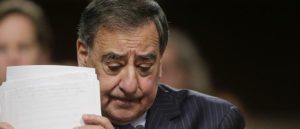
Under questioning from South Carolina Republican Sen. Lindsey Graham, Defense Secretary Leon Panetta could not explain why President Barack Obama spoke with him only once on Sept. 11, 2012 during the Benghazi terrorist attack, and never called back for any updates for over seven hours.
Here’s the exchange between Graham, Gen. Martin Dempsey and Sec. Panetta at a Senate Committee on Armed Services hearing on Thursday:
SEN. GRAHAM: Your testimony, as I understand it, Secretary Panetta, that you talked to the president of the United States one time.
SEC. PANETTA: I talked to him on Sept. 11 with regards to the fact that we were aware this attack was taking place.
SEN. GRAHAM: One time.
SEC. PANETTA: Right.
SEN. GRAHAM: What time did you tell him that?
SEC. PANETTA: I think that was approximately about 5 o’clock?
GEN. DEMPSEY: Yeah, about 5 o’clock.
SEC. PANETTA: About 5 o’clock.
SEN. GRAHAM: General Dempsey, did you ever talk to the president of the United States at all?
GEN. DEMPSEY: I was with the secretary when — at that same time.
SEN. GRAHAM: Did you talk to the president?
GEN. DEMPSEY: Yes.
SEN. GRAHAM: You talked to him how many times.
GEN. DEMPSEY: The same — one time.
SEN. GRAHAM: How long did the conversation last?
GEN. DEMPSEY: We were there in the office for probably 30 minutes.
SEN. GRAHAM: So you talked to him for 30 minutes, one time, and you never talked to him again, either one of you.
GEN. DEMPSEY: Until afterwards.
SEN. GRAHAM: Until after the attack was over.
GEN. DEMPSEY: That’s right.
SEN. GRAHAM: Thank you.
Were there any AC-130 gunships within a thousand miles of Benghazi, Libya?
GEN. DEMPSEY: No, sir.
SEN. GRAHAM: Were there any AC-130 gunships within 2,000 miles of Benghazi, Libya?
GEN. DEMPSEY: I have to go back and look at a map and figure out the distance.
Later in the hearing, Graham asked Panetta if he thought it was “typical” for a commander in chief to make no follow-up phone calls.
http://dailycaller.com/2013/02/07/panetta-cant-explain-why-obama-never-called-back-during-benghazi-attack-video/
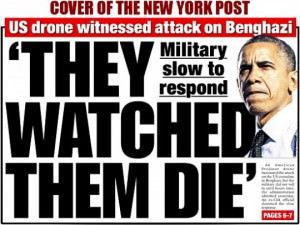
Editor’s Note: From Bre Payton and our friends at The Federalist.
4 Times Sidney Blumenthal Was More Than Just ‘A Friend’ To Hillary Clinton
Their friendship had the tendency to get weird, a lot.
By Bre Payton
October 23, 2015
Much of Thursday’s House committee hearing, which probed the events leading up to an attack on a U.S. consulate in Libya, focused on Hillary Clinton’s relationship with Sidney Blumenthal, a longtime friend and “fixer” of the Clintons. Several GOP committee members pointed out how she prioritized Blumenthal’s correspondence over that from Libyan ambassador Christopher Stevens, who didn’t even have Clinton’s email address.
So we learned that Clinton never directly corresponded via email with Stevens, who requested armed reinforcements multiple times just before he was killed in the September 11, 2012, attack on the U.S. mission in Benghazi. Hillary did, however, regularly correspond with Blementhal about affairs in Libya.
Why is this important?
Remember: Blumenthal didn’t work for the State Department. In fact, he was persona non grata in the White House. Clinton wanted to hire him, but President Obama refused to allow him to serve under his administration. That didn’t stop her from communicating with him about how things were going in war-torn Libya. Coincidentally, (or not-so-coincidentally) Blumenthal was working as an adviser to a shady business venture that sought to work with Libyan rebels. But more on that later.
Blumenthal didn’t work for the State Department. In fact, he was persona non grata in the White House.
He also sent her numerous private intelligence reports on the situation in Libya. She would then forward these reports to the White House — after deleting his name from the emails, of course.
“He was a friend who sent me information that he thought might be in some way helpful,” Clinton said on Thursday about the document swapping she did with Blumenthal. But the email correspondence between the two — and financial records indicate — that he was more than just a friend.
Let’s review the four times when their relationship got weird:
- Blumenthal Asked For Too Many Favors
Blumenthal had invested in Osprey Global Solutions, a military contractor that wanted to do business with the Libyan rebels. While this was going down, he pushed Clinton, who was serving as Secretary of State at the time, to support business relations between western military contractors and Libyan rebels. This kind of prompting, combined with his financial interests, seems to be on the illegal side of things, according to National Review. A cynic might even characterize Blumenthal’s efforts as blatant war-profiteering.
- He Was Getting Paid To Be Their Friend
The Clinton Foundation hired Blumenthal in 2009, despite grumblings from other employees that he only got the job because he was a friend of the Clintons. He was getting paid $10,000 a month while handling the business venture in Libya and urging Clinton to help him out with it in her role as America’s most powerful diplomat.
- He Advised Her, A Lot
When the use of torture overseas became a hot topic in the media during Clinton’s first year as secretary, Blumenthal was quick to advise her to keep quiet.
“Jane Mayer’s piece details the many moving and uncontrolled parts of the torture debate, which has become chronic and will flare up again and again. The ‘distraction’ will not go away. I would avoid ever being drawn into commenting on any aspect.”
This kind of advice and media finagling was evidently a regular thing he chatted about with Clinton. He sent her numerous emails claiming credit for manipulating the media into covering news a certain way that was favorable to Clinton. This sort of odd advice mixed with humblebrags is par for the course between these two, at least according to her emails.
And let’s not forget those late-night phone chats.
In the initial batch of Clinton’s emails that were made public, there was one that alludes to the kind of friendship they had:
From: HRC
To: Sidney Blumenthal
Date: Oct. 8, 2009; 10:35 p.m.
Subject: Are you still awake?
Body: I’ll call if you are
Translation: “Are you still awake, Friend? Can we talk?? Please?!”
- Clinton Paid More Attention To Sid’s Emails Than the Safety of Americans
Clinton apparently cared more about Dear Old Sid’s emails than she did the safety of her diplomats. As Rep. Trey Gowdy (R-S.C.) pointed out during the third round of Thursday’s committee hearing, she had asked Stevens to read and react to some of Blumenthal’s emails the same day she denied his request for more security at the Libyan embassy. Oh, and he asked for more security because the embassy suffered a bomb attack the day before.
So not only does it appear that Clinton dismissed the warning signs of a dangerous threat to American lives, but she also prioritized her friendship with Blumenthal over the safety concerns of Ambassador Stevens, who was serving under her.
Bre Payton is a staff writer at The Federalist. Follow her on Twitter.
Editor’s Note: From Dan Kovalik.
Human & Labor Rights Lawyer, Adjunct Professor of International Human Rights Law
Dan Kovalik graduated from Columbia University School of Law in 1993, and has served as a labor and human rights lawyer ever since. He has taught International Human Rights at the University of Pittsburgh School of Law since 2012.
Clinton Emails on Libya Expose The Lie of ‘Humanitarian Intervention’
01/22/2016 04:16 pm ET | Updated Jan 22, 2016
Dan Kovalik
By now, everyone but the most delusional must concede that the Libya intervention was a debacle of gigantic proportions. Libya remains a failed state with Jihadists controlling huge swaths of the country, including the once-prosperous town of Sirte.
The security of Tunisia, Mali and the Lake Chad Region (Nigeria, Niger, Chad, and Cameroon) has been profoundly undermined by the spill-over from the Libya conflict. And, though the NATO intervention in Libya was allegedly undertaken on humanitarian grounds, the human rights situation in Libya is a disaster, as “thousands of detainees [including children] languish in prisons without proper judicial review,” and “kidnappings and targeted killings are rampant.”
Incredibly, the deeper questions about the Libya intervention and its aftermath remain a largely verboden topic, even as the invasion’s prime intellectual author, Hillary Clinton, campaigns for the highest office in the land. However, thanks to the release of many of her emails from her time as Secretary of State, one can get a rare glimpse into the making of what has been claimed to be a “humanitarian intervention.” And, the emails show that the NATO operation was nothing of the sort.
Thus, while Clinton was able to obtain passage of U.N. Security Council Resolution 1973 – a resolution which authorized a no-fly zone to protect civilians – on March 17, 2011, those civilians that Clinton claimed needed most urgent protection (the civilians in the town of Benghazi) were relatively safe by this time. Thus, Hillary’s assistant, Huma Abedin, in an email (Doc No. C05778494) dated February 21, 2011 – that is, just a mere 4 days after the initial anti-government protests broke out in Libya — explains:
Based on numerous eyewitness reports, it is the Embassy’s assessment that the government no longer controls Benghazi. This is likely the case for Ajdabiyah as well. Numerous sources in Benghazi report that Libyan Interior Minister Abdul Fattah Younes has “changed sides” and is “now with the protesters in Benghazi.” The mood in Benghazi and Ajdabiyah is allegedly “celebratory” and all posters of Qadhafi have been knocked down. . . .
Then, on March 2, a couple of weeks before Resolution 1973 was passed, Harriet Spanos of USAID sent an email (Doc No. C05778340) describing the relative calm in Benghazi. Thus, she explains that “Security Reports . . . confirm that Benghazi has been calm over the past couple of days.” She explains that “economic activity is going on in Benghazi,” that shops and banks are open and that “[m]obile and landline phones are working and Internet has returned.”
Probably the most revealing email is dated March 30, 2011, just 11 days into the NATO bombing campaign which would go on until October, 20, when Qaddafi was finally murdered (after being sodomized). In this email (C05782459), entitled “Win this War,” Clinton’s closest adviser, Sidney Blumenthal, makes it clear that, in terms of the continuing reasons for the war, any “humanitarian motive offered is limited, conditional and refers to a specific past situation.” In other words, while NATO would go on bombing for another 7 months, Blumenthal is already admitting that there is really no humanitarian basis for continuing the conflict.
Still, Blumenthal insists on the importance for pressing on until final victory (i.e., the overthrow of Qaddafi, who he calls “Q”). And, he explains that the reasons for doing so include, first and foremost, boosting Obama’s then-anemic approval ratings. The other reasons he outlines are “establishing security in North Africa, securing democracy in Egypt and Tunisia, economic development, effect throughout Arab world and Africa, extending U.S. influence, counter-balancing Iran, etc.” Again, humanitarianism is notably absent from this list.
Moreover, in terms of the alleged goal of promoting regional security, a number of emails reflect the awareness that the bombing campaign, and the toppling of the aggressively anti-Al Qaida Qadhafi, might very well open a space for Al Qaida and allied forces to take over many parts of Libya, as they actually have. For example, one email (Doc No. C05780521), again from Blumenthal to Clinton, explains that “[t]raditionally, the eastern part of Libya has been a stronghold for radical Islamist groups, including the al Qaida-linked Libyan Islamic Fighting Group. While Qaddafi’s regime has been successful in suppressing the jihadist threat in Libya, the current situation opens the door for jihadist resurgence.” Given this knowledge, how Blumenthal could then argue that “winning the war” against Qaddafi was somehow necessary for regional security is bizarre in the extreme. Of course, such muddled thinking is not unique to Blumenthal or Clinton, but seems to pervade the leadership of both our political parties.
Meanwhile, the emails actually demonstrate a complete lack of concern for humanitarian violations by the pro-NATO rebels. Thus, in but another email to Hillary, dated March 27, 2011 (C057824501), Blumenthal explains, “[s]peaking in strict confidence, one rebel commander stated that his troops continue to summarily execute all foreign mercenaries in the fighting.” Now, summarily executing even armed combatants is a clear violation of the Geneva Conventions, but neither Blumenthal nor Hillary demonstrate much concern about such trifles.
Even more concerning, it became known during the course of the NATO invasion that the claims of foreign mercenaries fighting for Qaddafi were false; that, in fact, the alleged foreign mercenaries were really African guest workers. What was really happening was that the rebels were summarily arresting and murdering people who happened to be black, and doing so in very large numbers. In other words, it was the U.S.’s rebel friends who were actually carrying out genocide in Libya, and NATO, which had a UN mandate to protect civilians in Libya, was aiding and abetting them in doing it.
All of this should be of great concern for those truly interested in human rights, and for those interested in stopping the next war which will surely be premised on some alleged humanitarian concerns. This should be a lesson that such concerns should be looked at quite skeptically, and that, as international law requires, peaceful means should be the first resort to try to protect the lives of innocents. And, in terms of peaceful means, the Clinton emails reveal one other important fact – that before and during the NATO conflict, Clinton and her team knew very well, and actually feared, that the conflict in Libya might very well have been resolved through negotiations; that indeed, Muammar Qaddafi’s son Saif was actually trying to find ways to do just that. However, Clinton shunned such efforts, instead preferring a war, despite its quite predictably horrible consequences, which would give the U.S. and its allies the hand they wanted in the future of Libyan and African affairs. In the end, the welfare of the Libyan people, and of the people of Northern Africa, were sacrificed, not protected, by such a choice.
A phone call away. Then 13 hrs.
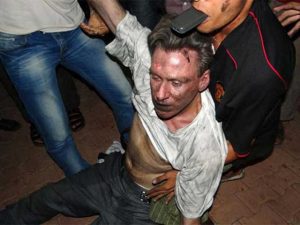
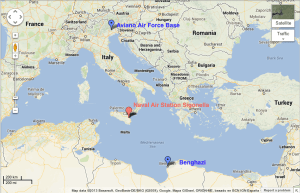
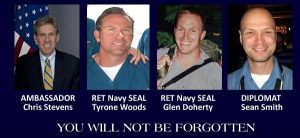


For those unaware…it’s still our country.

America First Million Member Sign-Up
Please join us in our commitment to promote American exceptionalism, freedom, our Constitution, our American way of life, and our safety and security by making a donation and subscribing to our periodic newsletters and messages by donating below.


